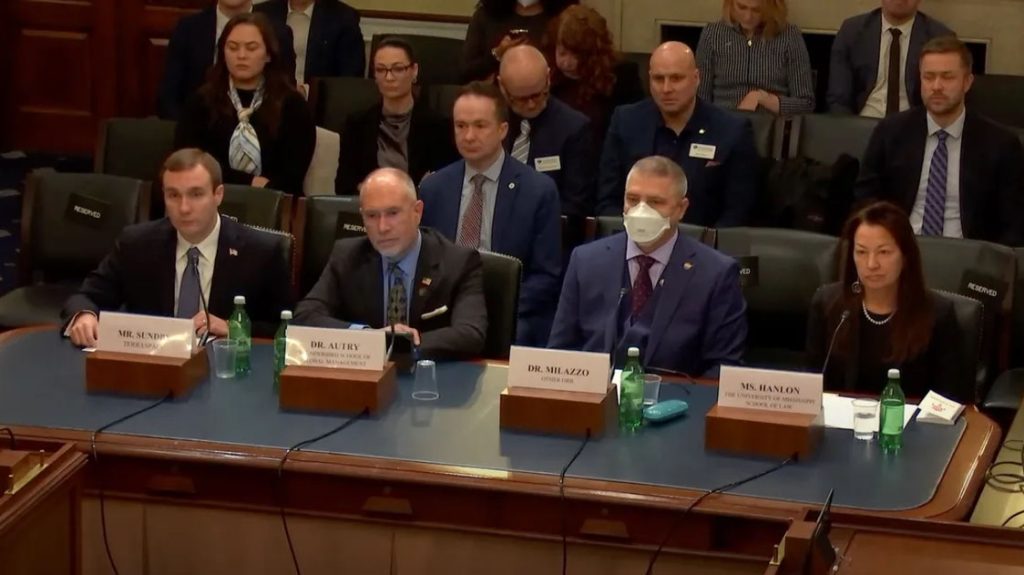Image: Dr. Greg Autry, second from left, and Michelle Hanlon, at far right, testifying at the House hearing.
On December 12, Dr. Greg Autry and Michelle Hanlon, Esq, both affiliated with the National Space Society (NSS), addressed the U.S. House of Representatives for its hearing on “The Mineral Supply Chain and the New Space Race.” Dr. Autry, a former member of the NSS Board of Directors and current Vice President of Space Development for NSS, is the Director and Clinical Professor of Space Leadership at Thunderbird School of Global Management, Arizona State University. Ms. Hanlon, a former NSS President and current member of the NSS Board of Directors, is the Executive Director of the Air and Space Law at the University of Mississippi and founder of For All Moonkind’s Institute on Space Law and Ethics.
NSS Executive Vice President Hoyt Davidson commented, “NSS congratulates Michelle and Greg on their testimony at the the ‘Mineral Supply Chain and the New Space Race’ hearing before the House of Representatives Committee on Natural Resources. Professor Hanlon is a past President of NSS and one of our leading thinkers on space law and policy. Her testimony explained the significance and importance of the U.S. and its Artemis allies playing a leading role in space development. Only by leading can we be sure that space law and norms of operations in space evolve toward free market practices versus a state-controlled construct as might be expected were China or another less democratic entity to seize this new high ground first.”
Davidson continued, “Dr. Autry explained the economic imperative and urgency of the U.S. and its allies being first to develop space resources for both economic and national security reasons. His testimony included examples of how greatly, and in some cases unexpectedly, our citizens and the world have benefitted significantly from past investments in space activities. He also championed the merits of reasonable levels of government funding for R&D to support dual-use space technologies even in the face of serious and competing needs for our current pressing problems.”
NSS encourages this new interest within our legislative branch regarding the importance of space resources to the future of our country and the world, and sees government policy, priorities, and regulation as critical to our nation’s ability to play a leading role in the peaceful development of space for the benefit of everyone on Earth. As Davidson put it, “This emerging effort, fueled by well aligned public-private partnerships, will allow us to tap the virtually limitless commodities in space, helping to relieve pressure on Earth’s environment. Space may one day be the source of new natural resources driving our economy.”
Professor Hanlon noted, “I am very grateful to the House Committee on Natural Resources for organizing this hearing. Space activities affect all of us every day and space resource utilization has the potential to impact all human lives in ways we cannot begin to imagine. This was the beginning of a conversation, one that revealed some skepticism of the concept of utilizing extraterrestrial natural resources. I hope that House members continue to allow voices, both pro and con, to be heard on this topic. As I mentioned in the hearing, the beauty of the United States is that everyone has a say. How we utilize space assets will affect all of us, and above all, we need to encourage awareness and debate. It was an honor to participate and I am deeply grateful for the opportunity offered by Chair Gosar.”
NSS supports the increasing interest in space by new parts of the U.S. government such as the House Natural Resources Committee. Space utilization for human benefit will gradually become a government-wide issue and one that will increasingly need to be addressed by a variety of committees and bodies within the U.S. government. Space resources are a key factor in our nation’s future success and are no longer merely within the domain of scientists alone as they have been labeled in the past.



















